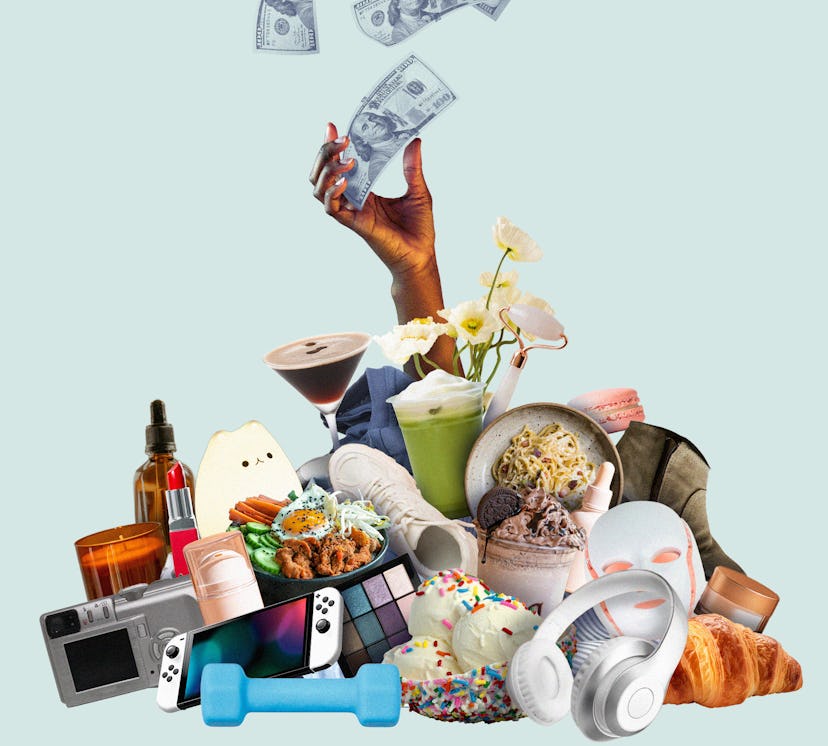Life
Why You Might Be Overspending & How To Get The Habit In Check
Everyone could stand to learn from these tips.

Raise your hand if this is you: You leave the house determined to spend no money, but somehow come home with a $22 smoothie, three $70 scented candles, and a deep sense of regret. Or maybe you're the type who stays home to "enjoy your rent," only to find yourself three hours deep in an online shopping rabbit hole. If this sounds familiar, congrats! You're officially part of the overspending club so many of us belong to but none of us signed up for.
But your smaller-than-expected bank balance isn’t just the result of your decision making. It’s also because in 2025, the pressure to spend is constant and increasingly effortless. Between tap-to-pay, one-click ordering, and QR codes that practically beg you to scan them, we're living in a world designed to separate us from our coins. Emotions and unconscious habits exacerbate the issue, often leading us to make choices that undermine our long-term goals.
But here's the thing: Your impromptu spending habits aren't a character flaw — they're just habits. And habits? Those can be changed. Here’s how to get your spending in check.
1. If You Feel The Urge To Shop Online
Let's be real: Your phone is basically a tiny spending machine disguised as a communication device. Luckily, there are easy little tweaks anyone can make to counteract your scroll and spend urge. Start with leaving your phone in the next room during evening couch hours to avoid shopping as you unwind. Disconnecting your credit card information from your devices also makes impulse buying harder, and keeps your information more secure. Set timers on social media apps to escape the siren song of targeted ads. While you can’t totally eliminate the urge to shop online, you can make yourself work for it, encouraging more intentional spending.
2. If Retail Is Your Therapy
They call it retail therapy for a reason. Shopping allows us to gain a sense of control, and “reward” ourselves for difficult or frustrating experiences. If you find yourself reaching for your credit card after a long day, take a beat. Set some rules for yourself — like instituting a 24-hour cooling off period when you feel tempted to make a big purchase.
When you're in your feelings and reaching for your wallet, pause and ask yourself: "Am I buying this because I need it, or because I'm trying to fill a void?" and "Will future me thank present me for this purchase?" Sometimes the answer is yes — and that's fine! But sometimes it's a hard no, and that's valuable information.
3. If Your Friends Are Expensive
FOMO and social pressure can make it easy to spend more than you intend, especially if your friends have higher incomes or more extravagant spending styles than you. Before you RSVP “Yes” to that cross-country wedding or agree to split the check even though you only ordered an appetizer, be honest with your friends about your budget, even if it feels a little uncomfortable. Establish some ground rules for yourself to deal with financial peer pressure, and set expectations for your friends ahead of time. Remember: they’ll still love you even if you can’t afford to drop a bag at an extravagant dinner every week.
4. If Looking At Your Credit Card Balance Sparks Anxiety
Picture this: You get paid, feel rich for approximately 30 seconds, pay rent, go out once, and suddenly you’re crushed by the idea of looking at your bank account balance. And if you don’t look at it, it doesn’t exist... right? Unfortunately, that’s not the way it works.
Taking control of your finances requires you to regularly check your credit card statement and understand the ins and outs of where your money is going. If you aren’t tracking your spending, you’re likely spending money on things you don’t need and missing out on valuable savings. Once you thoroughly analyze your spending, you can create a budget. And that’s so much more empowering than avoiding the situation altogether.
5. If You’re Not Using Your Money To Its Full Potential
Plot twist: you might be making saving into a bigger deal than it needs to be. Neglecting to set aside funds for your savings makes it even easier to overspend on things you don’t need. It pays to pay attention to your bank’s saving tools and features like automatic transfers, spare change reward programs, budgeting apps, and credit card rewards to make saving seamless.
Ready to get serious about your financial responsibility? Check out Bank of America's Better Money Habits page to start getting your money in order.